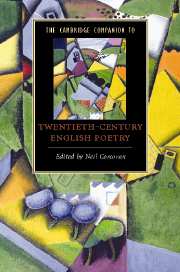Book contents
- Frontmatter
- Introduction
- Part I Contexts
- Part II Moderns
- Part III Modernists
- Part IV Later Modernities
- 10 Philip Larkin: a late modern poet
- 11 R. S. Thomas and modern Welsh poetry
- 12 Gender, feminism, poetry: Stevie Smith, Sylvia Plath, Jo Shapcott
- 13 Varieties of poetic sequence: Ted Hughes and Geoffrey Hill
- 14 Black British poetry and the translocal
- 15 Poetry and class: Tony Harrison, Peter Reading, Ken Smith, Sean O’Brien
- 16 A Scottish Renaissance: Edwin Morgan, Douglas Dunn, Liz Lochhead, Robert Crawford, Don Paterson, Kathleen Jamie
- 17 Lyric adaptations: James Fenton, Craig Raine, Christopher Reid, Simon Armitage, Carol Ann Duffy
- Index
14 - Black British poetry and the translocal
from Part IV - Later Modernities
Published online by Cambridge University Press: 28 January 2008
- Frontmatter
- Introduction
- Part I Contexts
- Part II Moderns
- Part III Modernists
- Part IV Later Modernities
- 10 Philip Larkin: a late modern poet
- 11 R. S. Thomas and modern Welsh poetry
- 12 Gender, feminism, poetry: Stevie Smith, Sylvia Plath, Jo Shapcott
- 13 Varieties of poetic sequence: Ted Hughes and Geoffrey Hill
- 14 Black British poetry and the translocal
- 15 Poetry and class: Tony Harrison, Peter Reading, Ken Smith, Sean O’Brien
- 16 A Scottish Renaissance: Edwin Morgan, Douglas Dunn, Liz Lochhead, Robert Crawford, Don Paterson, Kathleen Jamie
- 17 Lyric adaptations: James Fenton, Craig Raine, Christopher Reid, Simon Armitage, Carol Ann Duffy
- Index
Summary
'Wherever I hang me knickers - that's my home', declares the Guyanese- British poet Grace Nichols. Immersed in the sensory present of London and yet vividly remembering her former life in the Caribbean, she gives utterance to a diasporic sensibility, 'divided to de ocean / Divided to de bone'. Her poem enacts these split affinities in code-switching between Guyanese Creole ('me knickers') and Standard English ('my home') and shuttling imagistically between the Caribbean's 'humming-bird splendour' and London's 'misty greyness'. What are the implications of such ocean-splayed, register-shifting poetry for how we understand the relation of poetry to place? In modern and contemporary poetry studies, place is often conceived as either indefinite and abstract, or determinate and highly particularised. Modernist poetry, for example, has normally been understood as arising out of the shocks of modernity, wherever collisions between tradition and modernisation have arisen. At the same time, regionally defined poetries - e.g., the poetry of Northern Ireland or the New York school - are often seen as springing from the soil of a specific location. Yet neither the Aeolian model of poetry as airborne and placeless nor the Antaean model of poetry as drawing strength from a particular earthly plot is adequate to the poetry of geographic and cultural displacement - a poetry of multiple and mobile 'positionings', in Stuart Hall's term. In this chapter, I explore postcolonial and especially black British poetry as translocal - that is, as poetry that reconceives and remaps widely disparate geocultural spaces and histories in relation to one another, particularly in this instance metropolitan Britain as seen by migrants from its former colonies.
- Type
- Chapter
- Information
- The Cambridge Companion to Twentieth-Century English Poetry , pp. 200 - 214Publisher: Cambridge University PressPrint publication year: 2007
- 5
- Cited by



